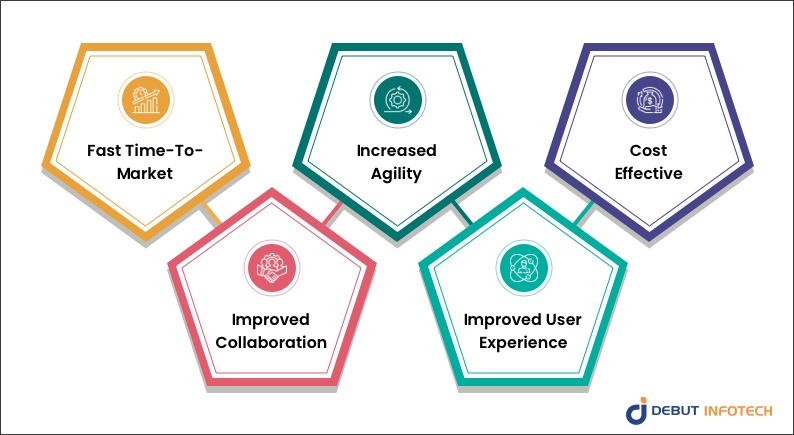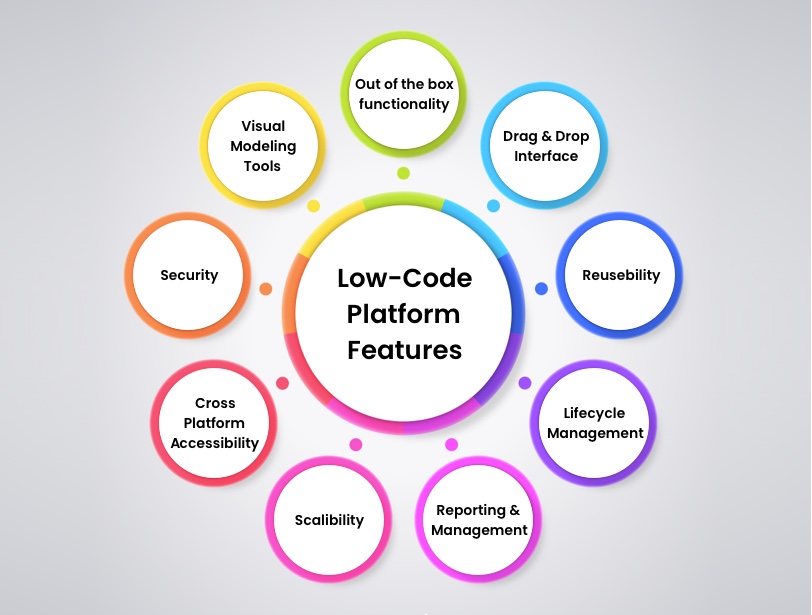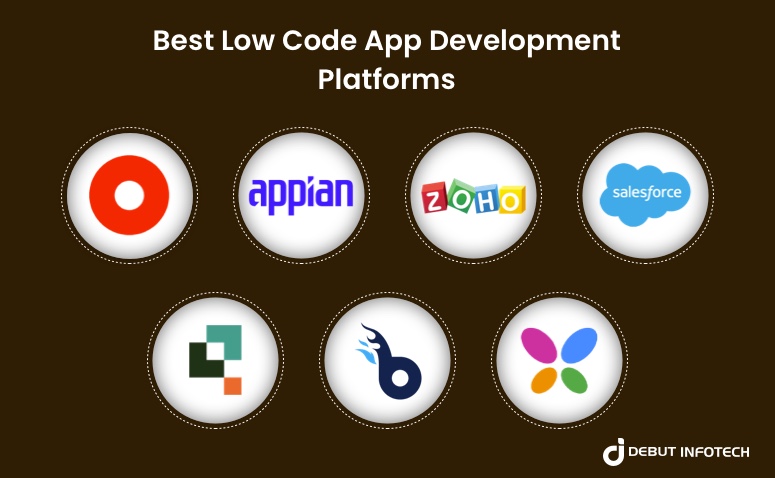Table of Contents
Home / Blog / Mobile Development
Top Low Code Mobile App Development Platforms
July 31, 2023

July 31, 2023
The software development industry is being completely transformed by low-code development platforms. When compared to conventional approaches to software development, low-code mobile app development platforms save time, money, and resources while helping businesses make better use of their data. As a result of their flexibility, low-code platforms are increasingly being used to develop not only software but also business processes and workflows.
The adaptability of these systems is further highlighted by the fact that they can meet the requirements of organizations spanning a wide range of sizes and organizational models and operating in a wide variety of sectors. In this way, a broad audience can enjoy the benefits of digital transformation at a lower cost.
How exactly can your company take advantage of low-code mobile app development platforms? Let’s delve deep in and see what we can unearth:
What Is A Low-Code Platform?
Low-code software development involves little to no coding during the app development process. A platform for low-code development uses drag-and-drop functionalities and logic-driven visual interfaces rather than the immersive coding required by conventional development methods.
Do you know as per Statista survey results, the global low code app development platform market revenue is expected to reach 69 billion dollars by 2026?
The platforms’ user-friendly tools make it possible for those with no background in software development or coding to build their own software applications, be they for business or mobile use. The low code approach is quickly becoming a popular alternative to traditional ways of making software because it is easy to use and has fewer functions. Developers who are not professionals can use the platforms just as easily as their professional counterparts to make software apps with different levels of complexity.
All of this adds up to a better ability to automate processes, respond quickly to changing needs, and speed up digital transformation, which fits perfectly with the goal of agility.
Advantages and Disadvantages of Low-Code Development
Low-code development combines drag-and-drop user interfaces with no-code platforms. Nevertheless, it offers the choice to manually code some elements for high flexibility. This RAD platform is widely used by software development teams to automate repetitive parts of software development, leaving the more challenging, intricate tasks to seasoned developers.

What are the Benefits of Low Code App Development?
1. Fast Time-To-Market
Low-code platforms let businesses make apps quickly and easily, which cuts down on the time it takes to get new goods and services on the market.
2. Increased Agility
Low-code systems make it easy for businesses to respond quickly to changes in the market and customer needs, which helps them stay ahead of the competition.
3. Cost Effective
Businesses can save money on development costs and put resources toward other parts of the company if they don’t have to do a lot of code.
4. Improved Collaboration
Low-code platforms have a visual interface that lets multiple team members work on the same project at the same time. This makes it easier for people in the company to work together and talk to each other.
5. Improved User Experience
Low-code platforms let businesses make apps that meet the special needs of their users. This gives users a better experience and makes customers happier.

What are the Low Code App Development Drawbacks?
1. Limited Capabilities
Low code can only do a few things. The developers of a system can only use the blocks that are already set up on a certain platform. This makes it hard to customize an app, especially when the existing blocks don’t have the features that are needed.
2. Performance Issues
Low-code platforms tend to be generic. This makes sense because no one tool is good at everything. Because of this, low-code platforms may not be able to handle large loads well, which could cause problems with how well they work. If this happens, the only way to fix it is to rewrite the app with code.
3. Integrations
If you use a low-code platform, you can’t connect apps to an outside system. This is especially true when developers need to connect to old systems with APIs that don’t follow the standards.
Important Features Of Low Code App Development Platforms
The objective of low-code platforms is to simplify the mobile app development process and make it more user-friendly, agile, and scalable. But what makes them so capable to facilitate this highly difficult process?

Here is an overview of the important minimal code platform characteristics that serve as the foundation of this software development approach:
1. Visual modeling tools
Low-code platforms have built-in components that represent any information in a comprehensible format. These visual modeling tools and approaches are important not just for providing everyone with developer skills, but also for speeding up the process of generating software applications as compared to code-based development.
2. Drag-and-drop interfaces
Low-code platforms simplify development with drag-and-drop functionality. These interfaces let you drag and drop app components instead of building them. Professional and amateur developers use drag-and-drop functionality.
3. Security
No secure low-code tool is sufficient for software development without proper security features, regardless of its user-friendliness or functionality. Security protocols are important for app safety on low-code platforms. Security features are important for the platform’s overall security.
4. Scalability
Scalability is a non-negotiable feature of low-code systems. This feature allows low-code apps to adapt to changing business needs and accommodate different numbers of users.
5. Cross-platform accessibility
Low code platform has cross-platform compatibility. This feature allows low code development on any major operating system. It helps build apps for different platforms and devices.
6. Out-of-the-box functionality
Low-code development platforms’ out-of-the-box feature allows the reuse of pre-configured modules, app components, and functionalities for multiple applications. For instance, pre-configured modules include core functions shared by multiple applications. These can be used anywhere, speeding up application development. Without reusability, low-code development would be meaningless.
7. Reporting and Monitoring
Low-code platforms have reporting and monitoring features to track app processes and workflows for effectiveness. Important for assessing app performance and analytics. Low code systems allow comparative monitoring to track app performance.
What Are The Best Low-Code Mobile App Development Platforms?
Now let’s move forward and learn about the top low-code mobile app development platforms that are often preferred by top app development companies.

1. OutSystems
OutSystems is a feature-rich low-code mobile app development platform for major companies and developers wishing to publish directly to consumer app marketplaces. This is a sophisticated, well-designed platform for creating visually appealing apps and managing the full software development lifecycle.
| Features | Benefits | Drawbacks |
| Error-free App Deployment | Offline Data Storage | Enterprise plans are expensive |
| Real-time Performance Dashboards | Deploy and rollback with a single click | No complete cloud-based IDE |
| Develop Scalable Apps | Support resources & interactive training | Clunky UI Editor |
| High-Grade Security | Robust app marketplace with pre-built components | Data migration is challenging |
| Native Support for Agile Development | Development guides based on skill level | |
2. Appian
It is the leading low-code app development platform that automates multiple workflow aspects to improve business outcomes. This platform enables app developers to create, test, and deploy applications from a centralized location by providing unified data.
| Features | Benefits | Drawbacks |
| Drag and drop tools | In-built team collaboration, & task management | Expensive |
| Native AI services | Easy integration with enterprise systems | Annoying Frequent Updates |
| Multiple built-in reusable components | Multiple security & data privacy features | Limited customization options |
| Low code data and apps | GDPR, HIPAA, and PCI-DSS compliant | Some superfluous fields |
| Complete automation | Decision engine for modeling complex logic | Coding knowledge required to fix errors |
3. Zoho Creator
Zoho Creator is a simple low-code platform with a clean design and many pre-built apps and fields. It is a cost-effective and user-friendly choice for SMBs seeking a business app creation tool, although it requires a proprietary scripting language for advanced customization and automation.
| Features | Benefits | Drawbacks |
| Multi-language support | Drag and drop builder | No third-party app marketplace |
| Create insightful reports | Simple, easy-to-use interface | Proprietary scripting language needed for app customization & automation |
| Workflow builder | Rich collection of pre-built app templates and fields | Lack of user management and support |
| Secure access controls | Supports barcode scanning | User Interface needs to be improved |
| Interactive dashboards and collaboration tools | Built-in auto-translation | Limited layout customizations |
4. Salesforce Platform
Salesforce App Cloud is the most potent low-code app development platform on the market, with an unrivalled visual toolkit and ecosystem of third parties, but its cluttered and perplexing user interface and disorganised library of tutorials prevent it from combining all of its impressive components into a seamless app creation process.
| Features | Benefits | Drawbacks |
| Customizable reports | Advanced features and customizations | Expensive |
| Social Media Integration | Powerful social collaboration resources | The software is clunky and slow |
| Real-time Sales Data | Automated workflows and approvals | UI and interactiveness are outdated |
| Real-time collaboration tools | Straightforward and intuitive UI | Weak Automation & difficult functionality |
| Built-in app marketplace | Accurate Data and Analytics | Too many features for startups & small businesses |
5. Quickbase
Quick Base is a user-friendly low-code and cloud-based application development platform that enables individuals to design, incorporate, and operate business software applications customised to their organisational processes. The proposed solution aims to foster collaboration between business and IT teams in order to expedite the ongoing development of distinctive processes.
| Features | Benefits | Drawbacks |
| Application lifecycle management | Reduces complexity and costs | Outdated user interface |
| Business process automation | Very fast basic app development | No native mobile app |
| Pipeline Integration | Straightforward wizard-based app building | Difficult to format reports |
| Advanced security controls | Rocust prebuilt app marketplace | Limited dashboard customization options |
6. BuildFire
BuildFire facilitates the development of dependable iOS and Android applications for businesses. The developer SDK includes built-in features that enable the creation of apps with customized features. With agile project management functionality, you can deliver custom mobile apps by following the mobile app development process.
| Features | Benefits | Drawbacks |
| Rapid Prototyping | Ease of customization | A costlier choice |
| Easy reporting or analytics | Good for small companies | No live chat support functionality |
| Prototype creation | Noticeable social networking features | Limited features and functionality |
| Compatibility testing | Advanced app development options | Limited number of design options |
| Debugging and deployment management | Smooth & easy navigation | Limited scalability |
7. KissFlow
KissFlow is a user-friendly low-code development platform that consists of powerful features which reduce the deployment time. It enables developers to handle multiple development jobs on a single platform. It includes built-in templates and a number of app features to increase developers’ efficiency and streamline business processes.
| Features | Benefits | Drawbacks |
| Scalable and intuitive | Broad library of templates and apps | Not ideal for small teams |
| Advanced analytics and reporting tools | Strong integration capabilities | Outdated documentation |
| Code-free workflow management | Smart form automation | Fewer communications tools |
| Reliable and secure platform | Versatile security settings | No native external database integrations |
| Both no-code and low-code development modules | Customizable analytics and reporting | Digital Workplace lacks an Android app |
Conclusion
A low-code mobile app development platform can certainly contribute to simplifying the app development process and reducing development time. Although, the mobile app development process depends on several factors such as technology, framework, features, functionalities, and more. A comprehensive guide on enterprise mobile app development can help you get a detailed understanding.
Whether you’re beginning from scratch or trying to improve an already-existing application, our team has the knowledge and experience to provide top-notch solutions catered to your particular requirements. Don’t let a lack of technical expertise prevent you from participating in the app creation process; with our approachable low-code platforms, anyone can. Together, let’s turn your app aspirations into reality!
Frequently Asked Questions (FAQs)
Q. Is A Low-code Development Platform beneficial for companies?
A. Yes, a low-code development platform is beneficial for companies as it boosts app development, reduces costs, and empowers non-technical users to create mobile apps efficiently.
Q. Who Can Use a Platform for Low-Code Development?
A. Anyone, regardless of coding experience, can use a low-code development platform. The platforms are user-friendly and do not need any prior coding experience.
Q. Is low code the future of software development?
A. Low-code development platforms offer the opportunity to develop software apps with minimal coding knowledge and skills. More and more companies are relying on low code as this reduces development time, effort, and cost.
Q. Is developing with a low-code platform simple?
A. Software development is simple with low-code solutions, even if you aren’t a seasoned programmer. Low-code platforms are also advantageous for professional developers. Low-code apps require less upkeep than traditionally coded apps because they are quicker, simpler, and easier to build.
Q. How do I choose a low-code development platform?
A. When selecting the low-code development platform, you need to consider multiple factors such as enterprise use cases, integration requirements, customization capabilities, pricing models, etc.
Q. Are low-code mobile app development platforms free?
A. There are several open-source low-code development platforms available in the market. However, you need to focus on the platform’s features and capabilities that can fulfill your needs.
Talk With Our Expert
Our Latest Insights
USA
2102 Linden LN, Palatine, IL 60067
+1-703-537-5009
[email protected]
UK
Debut Infotech Pvt Ltd
7 Pound Close, Yarnton, Oxfordshire, OX51QG
+44-770-304-0079
[email protected]
Canada
Debut Infotech Pvt Ltd
326 Parkvale Drive, Kitchener, ON N2R1Y7
+1-703-537-5009
[email protected]
INDIA
Debut Infotech Pvt Ltd
C-204, Ground floor, Industrial Area Phase 8B, Mohali, PB 160055
9888402396
[email protected]




Leave a Comment